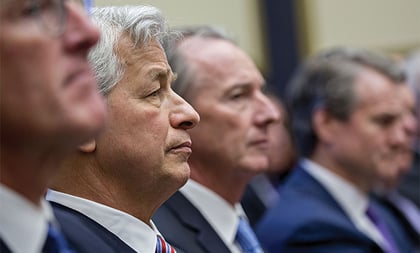The Securities and Exchange Commission’s advice-standards package — which includes the much-debated Regulation Best Interest — is going to be backed up by a “robust” economic analysis, the agency’s chief says, but the securities regulator is still struggling with its advisor exam rate. Meanwhile, President Donald Trump nominated a new SEC Commissioner, a bill to revamp the Internal Revenue Service gets a nod from the full House, and House Financial Services Committee Chairwoman Maxine Waters grilled big bank CEOs on Capitol Hill.
Economic Analysis of Final Advice Standards Rule. Amid concerns that the SEC has not done a proper economic analysis of its advice standards package, including Regulation Best Interest, its chairman said in early April that the rule would be well-scrutinized.
“I’m very confident that the economic analysis that will accompany a final rule in the space will be robust,” SEC Chairman Jay Clayton told reporters on the sidelines of the Practising Law Institute’s annual SEC Speaks conference in Washington.
SEC Commissioner Robert Jackson said on March 14 that the commission’s “economic analysis was not a serious attempt to understand the effects of the rule,” leaving it open to legal attacks. He said that, while he had voted to put the package out for comment, he couldn’t support it in its current form.
“Fundamentally, this can and should be a bipartisan rulemaking at the commission,” Jackson said Monday at the SEC Speaks event. “That’s why I voted for the proposal and that’s why I’ve been working so hard to get there on the final.”
Jackson added that he remains “very, very hopeful that the four of us, or five of us, whatever the case may be [can] get there. That’s so important because a rule like this is going to be long litigated, not just in the D.C. Circuit.”
Clayton told reporters that a final vote on Reg BI was “on our agenda to get done before September.”
OCIE Exams. Fewer RIA exams will take place this year due to the government shutdown, Pete Driscoll, head of the SEC’s Office of Compliance Inspections and Examinations said at the SEC Speaks event. “We’re still struggling to have good coverage in the IA space,” Driscoll said, although OCIE should be able to add staff to the team this year.
“Our [advisor exam] numbers will be less this year because we lost 35 days” during the shutdown, Driscoll said, adding that OCIE will not hit the 17% exam rate reached last year. OCIE, however, is “still pushing forward on our priorities.”
Cybersecurity will continue to be a focus for OCIE, specifically around the areas of governance and risk assessment and data loss prevention, and with an emphasis on cybersecurity measures of advisors with multiple branch offices.
New SEC Commissioner Nominee. President Trump announced on April 3 that he has nominated veteran securities lawyer Allison Herren Lee to serve as an SEC commissioner, replacing former Commissioner Kara Stein.
Lee, who served at the SEC from 2005 to 2018 in various roles including senior counsel in the Complex Financial Instruments Unit, and as counsel to Stein, enters the agency as it nears a vote on its contentious advice-standards package, including Reg BI.
Lee, a Democrat, has been nominated to serve a term expiring June 5, 2022; if confirmed by the Senate, she will replace Stein, who left the commission in early January.
Since leaving the SEC, Stein has, among other things, lectured and taught courses in financial regulation and corporate law at Universidad de Navarra in Pamplona, Spain, and LUISS Universita Guido Carli, Dipartimento di Giurisprudenza in Rome.
IRS Redesign Bill Passes House. The Taxpayer First Act of 2019, which would redesign the Internal Revenue Service, passed the full House on April 9.
The legislation, H.R. 1957, which passed the House Ways & Means Committee on April 2, has bipartisan support in both chambers of Congress.
Rep. Kevin Brady, R-Texas, the top Republican on the House Ways and Means Committee, stated after the vote that “with a new tax code, it is time for a new tax administrator. I applaud the House for passing the Taxpayer First Act — a bold step to redesign the IRS to be an agency with one singular mission: putting taxpayers first.”
The bill refocuses the “agency to live up to its mission of serving taxpayers, overhauling the IRS’ tools of enforcement, and strengthening the IRS’ ability to proactively combat identity theft and fraud,” Brady said.









 April 30, 2019 at 01:00 PM
April 30, 2019 at 01:00 PM








